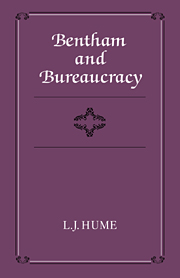Book contents
- Frontmatter
- Contents
- Preface
- Acknowledgements
- List of Abbreviations
- 1 Introduction
- 2 Government in eighteenth-century thought
- 3 The foundations of Bentham's thought: the Comment, the Fragment, the Introduction and Of Laws in General
- 4 Further explorations in jurisprudence
- 5 From principles to practice: the Panopticon and its companions
- 6 From the Panopticon to the Constitutional Code
- 7 The Constitutional Code and Bentham's theory of government
- 8 Conclusion
- Notes
- Bibliography
- Index
- Cambridge Studies in the History and Theory of Politics
- Frontmatter
- Contents
- Preface
- Acknowledgements
- List of Abbreviations
- 1 Introduction
- 2 Government in eighteenth-century thought
- 3 The foundations of Bentham's thought: the Comment, the Fragment, the Introduction and Of Laws in General
- 4 Further explorations in jurisprudence
- 5 From principles to practice: the Panopticon and its companions
- 6 From the Panopticon to the Constitutional Code
- 7 The Constitutional Code and Bentham's theory of government
- 8 Conclusion
- Notes
- Bibliography
- Index
- Cambridge Studies in the History and Theory of Politics
Summary
This work is an essay in the history of ideas, the report of an inquiry into the sources and evolution of Jeremy Bentham's ideas about the functions, structure and activities of government. Its starting point is the programme for the organization of government that Bentham set out in his Constitutional Code, which was the last and in a sense the culminating major product of his many years' work on jurisprudence and codification.
The Constitutional Code is in some respects a repellent work. Its arrangement is obscure and its language is obsolete and contorted. It represents, nevertheless, a remarkable achievement. It far surpasses in comprehensiveness and in attention to detail the many Constitutions that were drafted during Bentham's own lifetime, in North and South America, in France, in Norway, in Spain, in Portugal and elsewhere in Europe.
In particular, the five chapters relating to the Executive display these qualities and other important ones as well. They are much more extensive and go into much more detail than the material that Bentham's contemporaries provided for this branch of government: their 250 pages of double-column print contrast strikingly with, for example, the couple of score of Articles in the French Constitution of 1791, the 4 Sections in the Constitution of the United States of 1789, the 33 Articles in the Greek Constitution of 1822 or even the 100 Articles in the Spanish Constitution of 1812. And Bentham's chapters possess a theoretical consistency and sophistication and a prescience that are quite unusual among constitutional draftsmen at any time or in any place.
- Type
- Chapter
- Information
- Bentham and Bureaucracy , pp. 1 - 16Publisher: Cambridge University PressPrint publication year: 1981

